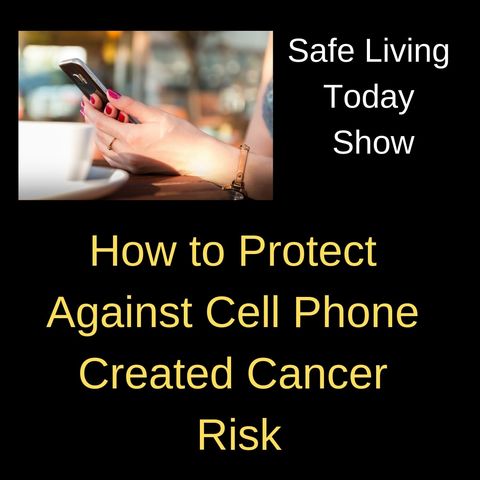How to Protect Against Cell Phone Created Cancer Risk

Download and listen anywhere
Download your favorite episodes and enjoy them, wherever you are! Sign up or log in now to access offline listening.
Description
Show Notes - How to Protect Against Cell Phone Created Cancer Risk Comments or questions: Email safelivingtoday@gmail.com This episode of safe living today we are going to answer the question...
show moreComments or questions: Email safelivingtoday@gmail.com
This episode of safe living today we are going to answer the question is there cancer risk when using your cell phone? And, if so, is there anything we can do to reduce that risk?
Hello, this is Stephen Carter and I am your host for the Safe Living Today show. today's conversation is about cell phone risk.
How risky is it really to use a cell phone? Are there ways we can mitigate that risk if in fact, risk is present?
Our first stop on today's discussion is the National Cancer Institute, which is part of NIH or National Institutes of Health Looking at their about cancer section. Here is a question:
Why is there concern that cell phones may cause cancer or other health problems? Their answer: there are three main reasons why people are concerned that cell phones - also known as mobile or wireless telephones - might have potential to cause certain types of cancer or other health problems.
1. Cellphones admit radio frequency radiation or radio waves, a form of non ionizing radiation from their antennas. Parts of the body nearest to the antenna can absorb this energy,
2. The number of cellphone users has increased rapidly. There were more than 400 million cell phone subscribers in the US in 2017 according to the Cellular Communications and Internet Association. Globally, there are more than 5 billion, users around the world.
3. Over time, the number of cell phone calls per day, the length of each call, the amount of time people use, cell phones have increased.
The National Cancer Institute page continues with additional information based on studies they reported. There are some studies that show a likelihood of effects from radiation.
Are there ways we can protect ourselves and lower the probability we would contract cancer from cell phone use?
The Environmental Working Group, which is an organization dedicated to the environment, has a useful infographic that suggests six ways to reduce the risk of cellphone use:
1. Use a headset or the phone speaker. According to EWG's, "Guide to Safer Cellphone Use", headsets emit much less radiation than phones. They say you can choose either wired or wireless headsets. My recommendation is to use a wired set of headphones because some wireless headsets emit continuous low level radiation. If you do use wireless earbuds, take them out when they're not in use. You can also of course, simply use the speaker mode on your phone, and that reduces radiation into the brain.
2. Hold phone away from your body. Hold the phone away from your ear, away from your body when you're talking. If you are using a headset, don't put the phone in your pocket, or don't clip it to your belt. Put it in your bag, your purse or put it on a nearby surface. Get it away from your body. The amount of radiation absorbed by your head and body decreases as a function of the distance away from the body and the phone.
3. Text more, talk less. Phones use less radiation when sending texts compared to when you are using voice communication. Texting keeps radiation away from your head. Use those text messages and skip phone calls whenever possible.
4. Call when the signal is strong. Check your phone signal strength meter. If that meter is weak, wait to make that call or even better text. Why does this matter? Because research tells us that radiation exposure increases dramatically when cell phone signals are weak.
5. Limit children's phone use. Children's brains can absorb twice as much cellphone radiation as those of adults, The Environmental Working Group joins health agencies and at least six countries in recommending limits for children's phone use. Limit their use to emergencies only.
6. Skip the radiation shield. This may seem counter intuitive. However, radiation shield such as antenna caps and the keypad covers reduce the connection quality and they force the phone to transmit with greater energy. That greater energy draw on the phone increases radiation. Remember recommendation number 4? Call when the signal is strong. Using a radiation shield can weaken that signal.
For more tips from the Environmental Working Group. Check out their site at https://ewg.org/cellphone-radiation.
Links:
Our website: http://www.SafeLivingToday.com
NIH's National Cancer Institute: https://www.cancer.gov/about-cancer/causes-prevention/risk/radiation/cell-phones-fact-sheet
Environmental Working Group's, "EWG's Guide to Safer Cell Phone Use": http://bit.ly/2LzVupc
If you found the information in this episode useful I asked you to please share it with loved ones. Share it with friends. Post it to social media. We do want to get the word out that it is vital to stay safe and taking precautions with our cell phone use can help us do exactly that until we again visit and chat
This is your host Stephen Carter for the Safe Living Today show asking you to please be well, be safe, and be blessed.
Information
| Author | Stephen Carter |
| Organization | Stephen Carter |
| Website | - |
| Tags |
Copyright 2024 - Spreaker Inc. an iHeartMedia Company

Comments